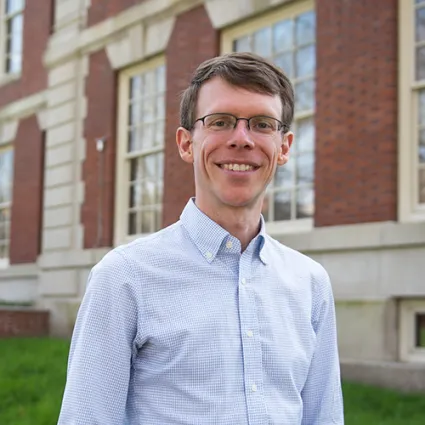Alexander Barron
Associate Professor of Environmental Science and Policy

Biography
Alex Barron graduated from Carleton College with a B.A. in chemistry and obtained his Ph.D. in ecology and evolutionary biology from Princeton University. Barron's graduate research examined interactions between plants, soils and the atmosphere. In particular, he focused on the patterns and controls of nitrogen fixation in Panamanian tropical rainforests, demonstrating that some trees in the bean family can “tune” their fixation rate across different forest types and that the element molybdenum can limit fixation rates of bacteria in the field.
More recently, Barron has applied his training as a scientist to policy design—in Congress, at the Environmental Protection Agency (EPA), and in the White House. In Congress, he worked in both the Senate and House of Representatives to design comprehensive climate legislation (including the American Clean Energy and Security Act) and covered international climate negotiations. At the EPA, Barron worked in the Office of Policy, where he advised senior EPA leadership and worked on a wide range of environmental regulations, including standards to reduce carbon pollution (for example, the Clean Power Plan), cross-state air pollution, and mercury and other toxics. He also helped guide EPA’s work on environmental economics and climate adaptation. He most recently served in the Biden Administration’s Office of Management and Budget, helping to restore strong and sensible climate and environmental regulations.
Barron's current research focuses on the design of climate policies to reduce greenhouse gas pollution and avoid catastrophic climate change. This includes evaluating how policies have worked in the past, designing specific policy incentives to reduce emissions, and work to improve the tools that policy makers use when designing those policies. These projects range in scale from national to hyper-local, and he is always looking for interesting collaborations.
His courses include Researching Environmental Problems, Sustainable Solutions, Sustainability and Social-Ecological Systems, and Energy and Climate Policy. In his spare time, Barron enjoys contra dancing, gardening, baking and hiking.
Selected Publications
Loughlin, D H., Barron, A.R., Chettri, C.B., O’Meara, A., Sarmiento, L. et al. Health and Air Pollutant Emission Impacts of Net Zero CO2 by 2050 Scenarios from the Energy Modeling Forum 37 Study. Energy and Climate Change 5 (2024) 100165.
Barron, A.R., Domeshek, M., Metz, L.E., Draucker, L.C. and A.L. Strong. 2021. Carbon neutrality should not be the end goal: Lessons for institutional climate action from U.S. higher education. One Earth.
Barron, A.R., Parker, B.J., Sayre, S.S, Weisbord, D.J. and S.S. Weber. 2020. Carbon pricing approaches for climate decisions in U.S. higher education: Proxy carbon prices for deep decarbonization. Elementa.
Kaufman, N., Barron, A.R., Krawczyk, W., Marsters, P., and H. McJeon. 2020. A near-term to net zero alternative to the social cost of carbon for setting carbon prices. Nature Climate Change. (featured on Vox)
Barron, A. R., Hafstead, M. A. C., & Morris, A. C. (2019). Policy Insights from Comparing Carbon Pricing Modeling Scenarios. Brookings Institution Discussion Paper.
(Multiple Authors) (2018) Internal Carbon Pricing in Higher Education Toolkit (beta)
Barron, A. R. (2018). Time to refine key climate policy models. Nature Climate Change.
Barron, A. R., Fawcett, A. A., Hafstead, M. A. C., Mcfarland, J. R., & Morris, A. C. (2018). Policy Insights from the EMF 32 Study On U.S.Carbon Tax Scenarios. Climate Change Economics.
Barron, A. R., Purves, D. W., & Hedin, L. O. (2011). Facultative nitrogen fixation by canopy legumes in a lowland tropical forest. Oecologia.
Barron, A. R., Wurzburger, N., Bellenger, J. P., Wright, S. J., Kraepiel, A. M. L., & Hedin, L. O. (2009). Molybdenum limitation of asymbiotic nitrogen fixation in tropical forest soils. Nature Geoscience.